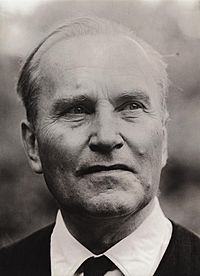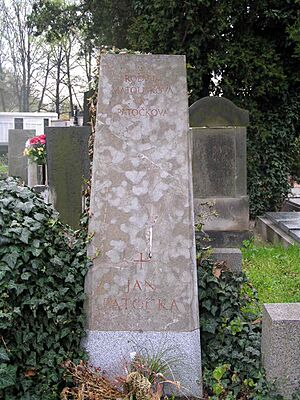Jan Patočka facts for kids
Quick facts for kids
Jan Patočka
|
|
|---|---|

Jan Patočka (1971)
Photo: Jindřich Přibík |
|
| Born | 1 June 1907 Turnov, Bohemia, Austria-Hungary
|
| Died | 13 March 1977 (aged 69) |
|
Notable work
|
|
| Era | 20th-century philosophy |
| Region | Western philosophy |
| School | Continental philosophy Phenomenology "Asubjective phenomenology" / Existential phenomenology "Negative Platonism" |
| Notable students |
|
|
Main interests
|
|
|
Notable ideas
|
|
|
Influenced
|
|
Jan Patočka (born June 1, 1907 – died March 13, 1977) was an important Czech philosopher. He studied in cities like Prague, Paris, Berlin, and Freiburg. He was one of the last students of famous philosophers Edmund Husserl and Martin Heidegger. In Freiburg, he also became lifelong friends with Husserl's assistant, Eugen Fink.
Patočka worked in Czechoslovakia for most of his life. He never joined the Communist Party, which was in power then. Because of this, he faced difficulties and was even persecuted. His life ended when he became a spokesperson for Charter 77, a group that spoke up for human rights.
He wrote and lectured a lot, sharing many ideas about how we experience the world. He also helped people understand Czech and European culture better. Some of his most important books, like Plato and Europe and Heretical Essays in the Philosophy of History, have been translated into English. In these books, he explored the idea of "care of the soul" from ancient Greek thinkers like Socrates and Plato, seeing it as a key part of European history.
Contents
Early Life and Studies
Jan Patočka went to the Jan Neruda Grammar School when he was young.
In 1936, he finished his important study called The Natural World as a Philosophical Problem. This was the first major study of its kind in the Czech language. It looked at how we understand the world around us. This work had a big impact on Czech philosophy. In 1937, Patočka became the main editor of a philosophy magazine called Česká mysl. A year later, he joined an international philosophy group.
His Philosophical Ideas
Patočka's work often focused on the idea of the "original world" or Lebenswelt. This means the world as we experience it directly, before we start thinking deeply about it. He explored how this world is built and where humans fit into it. He was influenced by Edmund Husserl's ideas about this topic. He also used some ideas from Martin Heidegger, like how history and technology shape our lives.
However, Patočka also thought Heidegger didn't fully explain how we exist in the world. This led him to appreciate the work of Hannah Arendt, another philosopher. Patočka then created his own unique idea about "three movements of human existence":
- Receiving: How we take in and understand the world around us.
- Reproduction: How we act and create things in the world.
- Transcendence: How we go beyond our everyday lives to think about bigger ideas and meaning.
He also translated many works by famous German philosophers like Georg Wilhelm Friedrich Hegel and Friedrich Wilhelm Joseph von Schelling into Czech. Patočka published his writings in Czech, German, and French.
Understanding Europe
Besides his work on the "natural world," Patočka also wrote a lot about ancient Greek philosophy. He explored how the ideas of ancient Greeks shaped our understanding of Europe. In the 1970s, he focused more and more on the idea of Europe.
Because he was not allowed to teach at universities (see below), he gave secret lectures in his home. These talks were about Greek thought, especially the ideas of Plato. These lectures are now known as Plato and Europe. He also discussed modern Czech philosophy, art, history, and politics. He was a respected expert on Czech thinkers like John Amos Comenius and Tomáš Masaryk. In 1971, he wrote about Comenius's ideas on education. In 1977, he wrote two studies about Masaryk.
Other famous philosophers, like Jacques Derrida, Paul Ricoeur, and Roman Jakobson, studied and discussed Patočka's book Heretical Essays in the Philosophy of History.
Facing Challenges
From 1939 to 1945, Czech universities were closed. Also, between 1951 and 1968, and again from 1972 onwards, Patočka was not allowed to teach. Only a few of his books were published during his lifetime. Most of his writings were shared as typed copies among his students and became widely known only after he passed away.
Along with other thinkers who were banned, he gave lectures at what was called the "Underground University." This was an informal school that aimed to provide free and uncensored education.
In January 1977, he became one of the first people to sign and speak for Charter 77. This was a human rights movement in Czechoslovakia. For three months after Charter 77 was announced, he worked very hard, writing and speaking about its meaning, even though his health was getting worse. The police also questioned him about his involvement.
On March 3, 1977, the police held him for ten hours. They had tricked him into thinking he would meet a high-ranking official. This was a way to stop him from attending an event at the West German embassy. He became ill that evening and was taken to the hospital. His health improved briefly, allowing him to give one last interview and write a final essay. On March 11, his health got worse again, and on March 13, he died at the age of 69.
His brother, František Patočka, was a microbiologist.
List of Works
- The Natural World as a Philosophical Problem
- An Introduction to Husserl's Phenomenology
- Aristotle, his Predecessors and his Heirs
- Body, Community, Language, World
- Negative Platonism
- Plato and Europe
- Who are the Czechs?
- Care for the Soul
- Heretical Essays in the Philosophy of History
- Two Studies on Masaryk
In English
- "Wars of the Twentieth Century and the Twentieth Century as War". Telos 30 (Winter 1976–77). New York: Telos Press.
- Jan Patocka: Philosophy and Selected Writings. Edited by Erazim Kohak. Chicago & London: The Chicago University Press, 1989.
- Body, Community, Language, World. Translated by Erazim Kohák. Edited by James Dodd. Chicago, IL: Open Court, 1998.
- Heretical Essays in the Philosophy of History. Translated by Erazim Kohák. Edited by James Dodd. Chicago, IL: Open Court, 1996.
- An Introduction to Husserl's Phenomenology. Translated by Erazim Kohák. Edited by James Dodd. Chicago, IL: Open Court, 1996.
- Plato and Europe. Translated by Petr Lom. Stanford, CA: Stanford University Press, 2002.
- The Natural World as a Philosophical Problem. Translated by Erika Abrams. Edited by Ivan Chvatík and Ľubica Učnik. Evanston, IL: Northwestern University Press, 2016.
- The Selected Writings of Jan Patočka. Edited by Erin Plunkett. London: Bloomsbury, 2022.
Media
In 2017, a movie called The Socrates of Prague was filmed in Prague and shown for the first time in Brussels. This film looks at Patočka's life and work during the Communist era in Central Europe. It includes interviews with many of his students and friends.
See also
 In Spanish: Jan Patočka para niños
In Spanish: Jan Patočka para niños
 | Anna J. Cooper |
 | Mary McLeod Bethune |
 | Lillie Mae Bradford |


